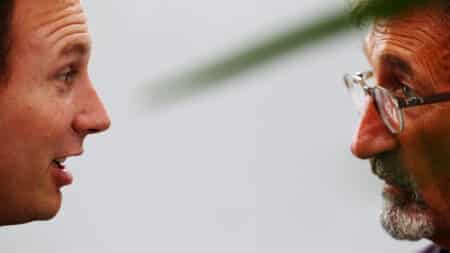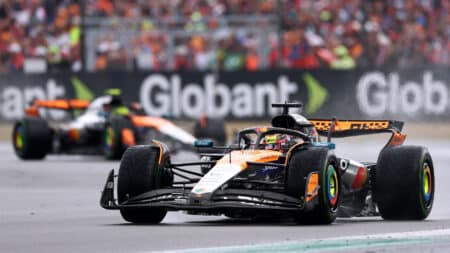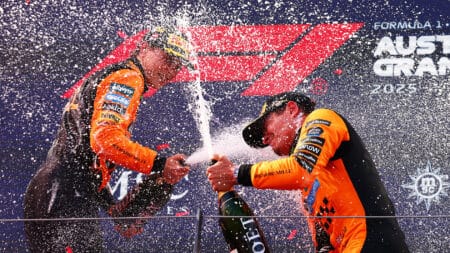
Horner's departure shows age of the maverick F1 boss is over
Christian Horner has now left Red Bull, the last of a certain breed of F1 team principal
Hidden away at Southampton University is an engineering doctorate student called Rich McIlroy. He can be found in a pokey little room that is filled, almost entirely, by a Jaguar X-type.
At the front of the car’s nose is a giant screen depicting a normal driving environment: There are houses, road signs, junctions and cars (you can make out a Shelby Daytona parked in a driveway – the man who designed the program clearly likes his American muscle).
While a Jaguar X-type may not seem the perfect car to use in a study on fuel consumption, it doesn’t make a difference to this particular project. McIlroy isn’t interested in what savings can be made from a more efficient engine; he’s interested in the biggest factor in fuel consumption – the human behind the wheel.
“I did a degree and then a masters in psychology before I moved into the engineering department,” McIlroy tells me as I try and get into the X-type without stepping on any of the cables which litter the floor. “It makes it quite interesting because on our engineering doctorate we’ve got 10 to 15 students a year and almost all of them have a civil engineering, physics or maths background. I’m here with a human behaviour background and they’re all talking gudgeon pins. When I give a presentation they ask ‘what are the engine parameters?’ I have no idea; I’m interested in the affect the person driving it has.”
It goes without saying that the biggest fuel ‘consumer’ is a heavy right foot. In order to eke out extra miles you need to keep speed constant and use the lowest revs possible, which means changing up the gears as early as 2000rpm in a diesel and 2500rpm in a petrol-powered car. You’re looking at a 20 per cent saving if you can follow those rules, but the question facing McIlroy at the moment is how do you encourage drivers to do that? How do you educate them?
“It’s going to become a lot more important with electric cars where your range is limited,” he says after I have crashed the simulator twice. “If your driving can make a third of a difference on your useable range then something that helps you achieve that is going to be useful.”
McIlroy has only just started his doctorate, but is already looking at a vibrating accelerator pedal, which will warn you when you’re using more fuel than you need to. To me, this did sound like a slightly superfluous proposition – surely everyone knows that the more you use the accelerator, the more fuel you’ll use?
Anytime I think something like that, though, I am reminded of the time that I was approached on a London petrol forecourt by someone who asked me to take a look at their car. “I’ve just driven from Birmingham and it’s making an awful noise,” they said. On closer inspection the car had four completely flat tyres.
“We’re also looking at radar and sat nav because the technology on those will know there’s a braking event up ahead long before you will. It’ll know there’s a sharp corner coming up and we can warn the driver long before so that they can coast down to the right speed rather than slamming on the brakes at the last second and using more fuel.
“We’re part funded by Jaguar, hence the car, and it was concerned, as I am, that people will want to turn the vibrating pedal off. That won’t be a problem as it’s very easy to link it to one of the car’s modes so the pedal won’t vibrate in sport mode while it will when it’s in eco. If you’re doing your daily commute or penny pinching you’ll want to have the feedback while if you’re on a track day you definitely won’t.”
More road car content
Are car journalists ‘bought’?
Honda is back
BMW’s i3 leads the electric car field
Charles will be missed at Morgan
Speed (20 per cent saving)
It’s the obvious one, but use the throttle sparingly and change up at low revs.
Air conditioning (20 per cent saving)
Once you’ve cooled down, turn it off. Not such a useful tip if you live in the UAE. All electrical parts on the car use fuel, however little, so bin that portable fridge you have in the boot.
Wind resistance (7 per cent saving)
There’s no need to start taping over shut lines, but don’t leave a roof rack on there if you don’t need it. Keep the windows closed and if you’ve got a tarpaulin covering your roof rack, make sure it’s tight.
Spark plugs (5 per cent saving)
If they’re worn they won’t ignite your mixture properly. No need to change them every 100 miles, but keep an eye on them.
Load (5 per cent saving)
This doesn’t just apply to unnecessary heavy-set passengers – don’t leave things in the car you don’t need. Also, if you want to save every drop of fuel, only fill the tank to ½ or ¾ full. The extra weight increases fuel consumption. Also, if you fill your tank to the brim some will spill out.
Engine (5 per cent saving)
Keep on top of your services and especially the engine management system.
Tyres (5 per cent saving)
Make sure you keep your tyres pumped up and get your wheel alignment checked every year. You can also buy fuel-efficient tyres nowadays.
Time of day (savings depend wildly)
Need to head out for something that isn’t urgent? Don’t go during rush hour then.
Get going (savings labelled as ‘significant’)
Once you’ve started your car get on the road. Don’t leave it idling to warm up. Those of you with older cars will flinch at this, but there’s no reason why you have to rev the car’s exhaust off in order to drive. Getting the car up to temperature uses more fuel so try and combine trips as well.
Air filters and fuel system (savings labelled as ‘significant’)
Make sure they’re both clean. A blocked air filter will mean the engine uses more fuel while clogged injectors and fuel filters can lead to bad spray patterns and therefore bad combustion. Also, make sure you use the right oil for the car.
Go to a cheaper petrol station (up to 10p per litre in places)
Obviously some fuels are better than others and this has an affect on how much you use, but it’s worth typing in your postcode to www.petrolprices.com. You may well find there’s much cheaper petrol just down the road.
Leave the car at home (100 per cent saving)
We know, it’s an obvious one, but do you really need to drive? If you like going for a Sunday drive and sticking to 40mph both in and out of town speed limits stay at home. Please.

Christian Horner has now left Red Bull, the last of a certain breed of F1 team principal

Was Oscar Piastri the real winner in the long run after Silverstone? asks James Elson

Lewis Hamilton hadn't won in almost three years – and then produced a sensational victory at Silverstone 2024. James Elson explains why it was his best ever

Describing this year's championship race as a 'battle' might be slightly over-egging it, writes James Elson